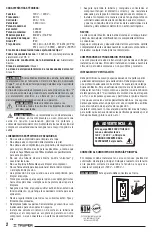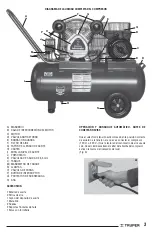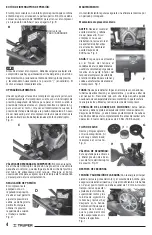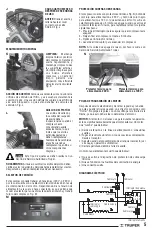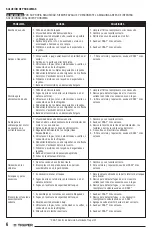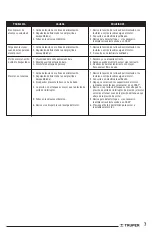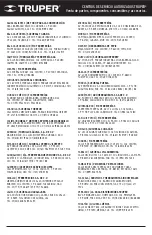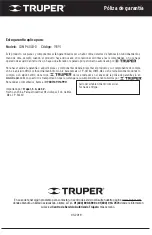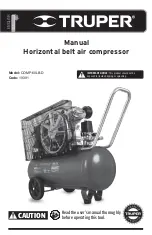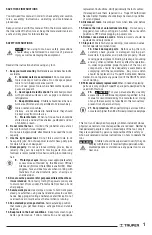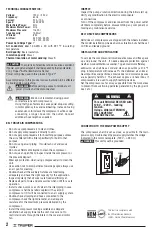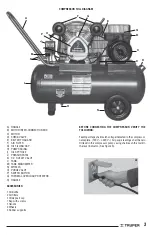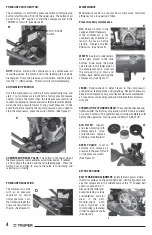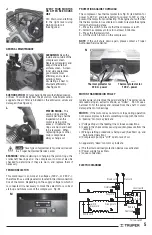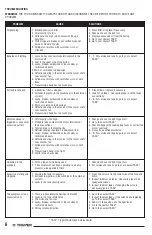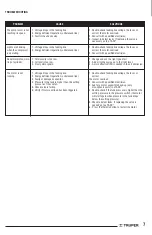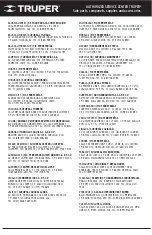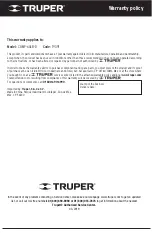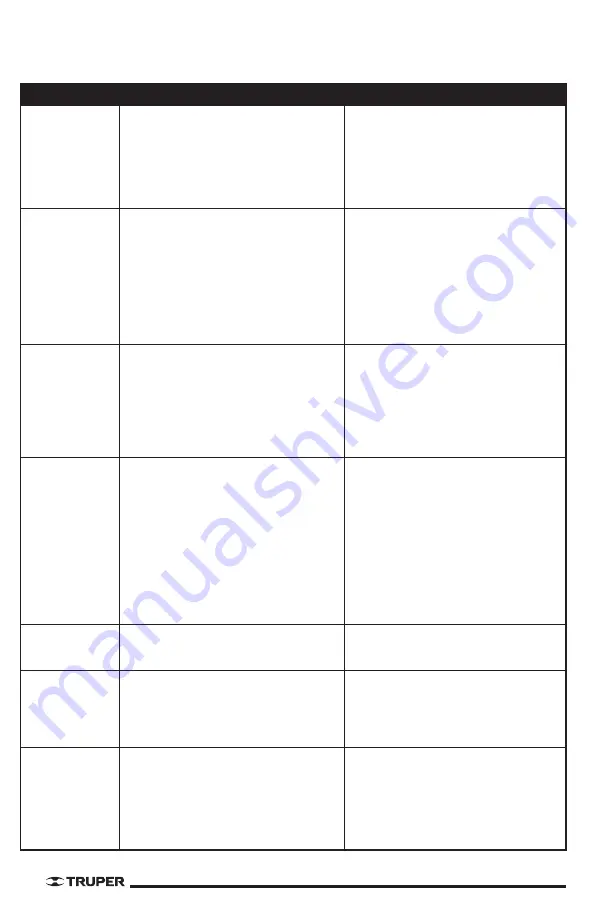
6
TROUBLESHOOTING
WARNING!
FOR YOUR OWN SAFETY ALWAYS TURN OFF AND DISCONNECT THE UNIT BEFORE TRYING TO SOLVE ANY
PROBLEM.
CAUSE
1. Blocked admission filter
2. Oil viscosity is to low.
3. Oil level is too high (when excessive fill-up is
possible).
4. Piston rings are broken or not settled. Gaps not
tiered or stuck in the slot.
5. Cylinders or pistons with scratches, worn or
streaked.
1. Loose pulley or excessive axial backlash in the
motor shaft.
2. Coal in the upper side of the piston.
3. Leaky, broken, carbonized or loose valves or
restricted air ducts.
4.Worn or scratched rod bearings
5. Defective bearing in the crank or in the motor shaft.
Loose motor fan.
6. Cylinders or pistons with scratches, worn or with
lines.
7. Transmission band has too much play.
1. Admission filter is clogged.
2. Air leaks in piping (in the machine or in the external
system).
3. Leaky, broken, carbonized or loose valves or
restricted air ducts.
4. Worn or scratched rod bearings
5. Defective bearing in the crank or in the motor shaft.
Loose motor fan.
6. Transmission band has too much play.
1. Oil viscosity is too high.
2. Probable false contact in the motor terminals or
their connections.
3. Tension drop in the feeding line.
4. Deficient energy regulation (unbalanced line).
5. Leaky, broken, carbonized or loose valves or
restricted air ducts.
6. Defective bearing in the crank or in the motor shaft.
Loose motor fan.
7. Cylinders or pistons with scratches, worn or with
lines.
8. Transmission band is too tight
9. Faults in the check valve.
1. Wrong type of oil is being used.
2. The compressor has been operating in a damp
place for a long period of time.
1. Draining the tank is necessary.
2. Air leaks in pipeline (in the machine or the external
system).
3. Leaks in the tank security valve
1. There is a possibility the flywheel is blocked.
2. Leaks in the tank safety valve.
3. The oil level is too low.
4. Leaky, broken, carbonized or loose valves or
restricted air ducts.
5. Wrong rotation direction.
SOLUTIONS
1. Clean filter or replace if necessary.
2. Change and use the right oil.
3. Remove excessive oil from the casing.
4. Go to your nearest TASC*
5. Go to your nearest TASC*
1 - 7. For service and repairs go to your nearest
TASC*
1. Clean filter or replace if necessary.
2. Look for air leaks. Use sealing tape in all the leaky
connections.
3 - 6. For service and repairs go to your nearest
TASC*
1. Change and use the right type of oil.
2. Go to the nearest TASC*
3. Check voltage in the feeding line fuses or correct the
motor overload.
4. Consult a qualified electrician.
5 - 9. For service and repairs go to your nearest
TASC*
1. Change and use the right type of oil
2. For service and repairs go to your nearest TASC*
1. Open the valve set in the lower side of the tank and
drain.
2. Inspect to detect air leaks. Use sealing tape in all
leaky connections.
3. Inspect to detect leaks. If changing the valve is
necessary go to a TASC*
1. Go to the nearest TASC*
2. Inspect to detect leaks. If the valve needs replacing
go to the nearest TASC*
3. Add oil in the casing up to the right level.
4. Go to the nearest TASC*
5. Go to the nearest TASC*
PROBLEM
Oil pumping
Banging and rattling.
Air feed is reduced.
Motor overload is
triggered or consumes
excessive current
Oxidation in the
cylinders
Excessive starting and
stopping
The compressor runs
excessively hot
* TASC: Truper® Authorized Service Center.

